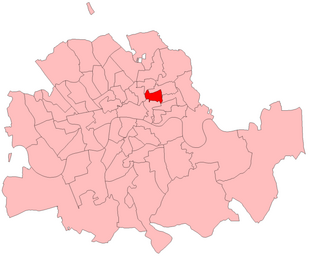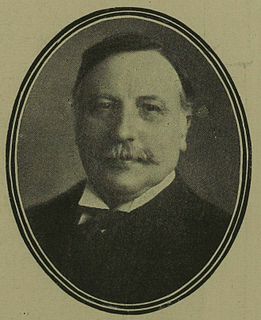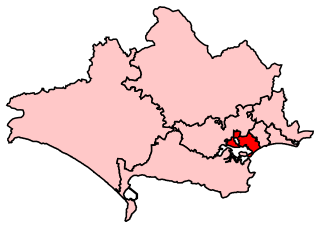The Cockermouth by-election, 1906 was a by-election held on 3 August 1906 for the British House of Commons constituency of Cockermouth.
The Hastings by-election 1908 was a Parliamentary by-election. Hastings returned one Member of Parliament to the House of Commons of the United Kingdom, elected by the first past the post voting system.

Sir Stuart Montagu Samuel, 1st Baronet was a British banker and Liberal politician who was Member of Parliament for Whitechapel.
The Middlesbrough by-election, 1878 was a parliamentary by-election held on 5 July 1878 to elect a new Member of Parliament (MP) for the British House of Commons constituency of Middlesbrough in the North Riding of Yorkshire.
The Stalybridge by-election was a Parliamentary by-election. It returned one Member of Parliament to the House of Commons of the United Kingdom, elected by the first past the post voting system.
The Hull by-election, 1907 was a parliamentary by-election held in England for the House of Commons constituency of Hull West on 11 November 1907.
The Ross and Cromarty by-election was a Parliamentary by-election. It returned one Member of Parliament to the House of Commons of the Parliament of the United Kingdom, elected by the first past the post voting system.

The Bethnal Green South West by-election was a Parliamentary by-election. It returned one Member of Parliament to the House of Commons of the United Kingdom, elected by the first past the post voting system.
The Carmarthen District by-election, 1912 was a Parliamentary by-election held in the United Kingdom on 29 January 1912 for the Carmarthen District in Wales. The constituency of Carmarthen District of Boroughs, was centred on the boroughs of Carmarthen and Llanelli. It returned one Member of Parliament to the House of Commons of the Parliament of the United Kingdom, elected by the first past the post voting system.

The Wandsworth by-election was a Parliamentary by-election. It returned one Member of Parliament to the House of Commons of the United Kingdom, elected by the first past the post voting system.
The Liverpool Kirkdale by-election, 1907 was a by-election held in England on 27 September 1907 for the House of Commons constituency of Liverpool Kirkdale, a division of the city of Liverpool.

The Finsbury East by-election was a Parliamentary by-election. It returned one Member of Parliament to the House of Commons of the United Kingdom, elected by the first past the post voting system.
The Dumfries Burghs by-election was a Parliamentary by-election. It returned one Member of Parliament to the House of Commons of the United Kingdom, elected by the first past the post voting system.
The Chelmsford by-election was a Parliamentary by-election. It returned one Member of Parliament to the House of Commons of the United Kingdom, elected by the first past the post voting system.
The Newcastle-upon-Tyne by-election was a Parliamentary by-election. It returned two Members of Parliament to the House of Commons of the United Kingdom, elected by the first past the post voting system.

The Haggerston by-election was a Parliamentary by-election. It returned one Member of Parliament to the House of Commons of the United Kingdom, elected by the first past the post voting system.
The Stirling Burghs by-election was a Parliamentary by-election. It returned one Member of Parliament to the House of Commons of the United Kingdom, elected by the first past the post voting system. The by-election was caused by the death of the former Liberal Prime Minister, Sir Henry Campbell-Bannerman
The Ilkeston by-election was a Parliamentary by-election in Derbyshire. It returned one Member of Parliament to the House of Commons of the United Kingdom, elected by the first past the post voting system.

Orkney and Shetland is a constituency of the House of Commons of the Parliament of the United Kingdom. It elects one Member of Parliament (MP) by the first past the post system of election. In the Scottish Parliament, Orkney and Shetland are separate constituencies.
The Basingstoke by-election of 1906 was held due to the death of the incumbent Conservative MP, Arthur Frederick Jeffreys and was won by the Conservative candidate Arthur Salter.












